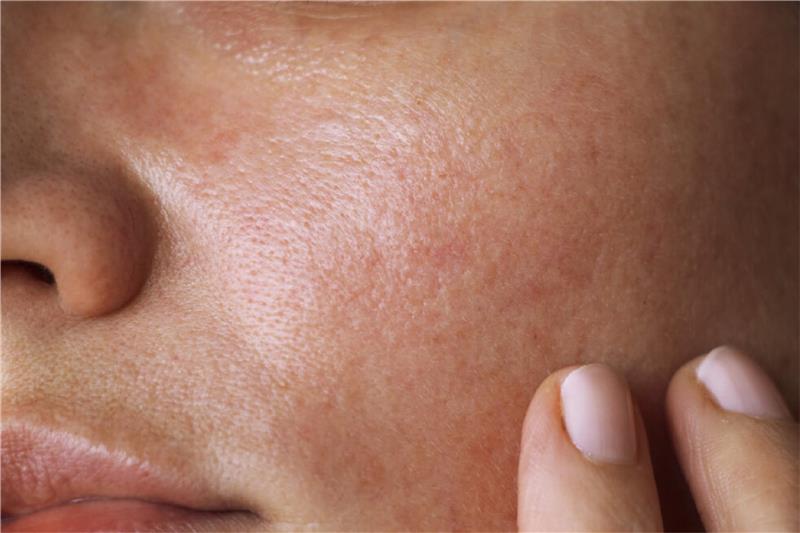
Think oily skin and you probably imagine an endless battle with blotting papers and mid-day powder touch-ups. But here’s the kicker: oily and dehydrated skin can exist at the same time. It sounds like a contradiction, but trust us, it’s more common than you think. Don’t worry, we’re here to decode the mystery so you (and your shine-prone T-zone) can finally breathe easy.
Understanding the Difference Between Dry and Dehydrated Skin
When your skin feels rough or tight, it’s tempting to label it as dry, but here’s the truth: dryness and dehydration are two different things. One’s a skin type, while the other is a temporary state your skin goes through.
What Is Dehydrated Skin?
Dehydrated skin simply means your skin lacks hydration or water. This can happen due to factors like harsh weather, over-exfoliation, air conditioning, or using products that strip away moisture. The good news? It’s not permanent – meaning with the right hydration and gentle care, you can restore balance.
How Is Dry Skin Different from Dehydrated Skin?
Dry skin occurs due to less oil prdoductionl (sebum), which results in rough patches and an overall lack of suppleness. Unlike dehydration, which is all about water loss, dry skin needs more oil-rich products to strengthen the skin barrier.
Can Dehydrated Skin Be Oily at the Same Time?
Surprisingly, yes! Here’s how it works: dehydration compromises your skin’s natural barrier, making it harder to retain moisture. In response, your sebaceous glands pump out more sebum in an attempt to protect. But instead of solving the issue, this excess oil just sits on the surface, leading to clogged pores, breakouts, and that greasy-yet-tight feeling.
Causes of Dehydrated Oily Skin
Skin looking slick on the outside but craving water on the inside? This imbalance usually stems from both external aggressors and internal lifestyle factors that weaken the skin barrier. Let’s dive deeper into what could be causing it.
1. Environmental Stressors and Climate
Exposure to harsh weather conditions, whether it’s the scorching summer heat or the humid monsoon – can leave your skin dehydrated. Pollution, UV rays and other environmental stressors can also increase oil production, forcing your skin to compensate.
2. Over-Cleansing or Using Harsh Products
Since oily skin feels greasy, wanting to cleanse and scrub it multiple times a day is just human instinct. But here’s the problem: over-cleansing or using alcohol-based products not only strips away excess oil but also your skin’s natural moisture. This ends up creating the vicious cycle of oil and dryness.
3. Skipping Moisturizer Due to Excess Oil
In skincare, few myths are as persistent as the idea that oily skin doesn’t need hydration. In reality, skipping this step only worsens dehydration. Because, when your skin lacks water, it starts producing excess sebum to lock in what little hydration it has.
4. Internal Factors Like Diet and Water Intake
They say, “You are what you eat,” and your skin is living proof of it. Dehydration often stems from within – think too much coffee, cocktails, and salty chips, and not enough water or omega-3.
Common Signs You Have Oily but Dehydrated Skin
Oily skin doesn’t always equal hydrated skin, despite what most people think. In reality, it’s your skin sending an SOS signal for some much needed care. Here’s what to watch out for:
1. Oily Yet Tight or Flaky Skin
If your face feels slick to touch but uncomfortable underneath, it’s a clear sign of dehydration. You might also notice dry, flaky patches, especially around the nose or mouth, despite all that surface oil.
2, Increased Breakouts or Sensitivity
A compromised skin barrier is more vulnerable to irritation, leading to redness, heightened sensitivity, and conditions that make breakouts more likely.
3. Dull and Uneven Texture Despite Oiliness
You’d think oily skin would always have a natural glow, but dehydrated oily skin tells a different story. Even with the shine, your skin can look lackluster, rough, or uneven because it lacks the water it needs for a smooth, plump appearance.
4, Makeup Doesn’t Sit Well or Fades Quickly
If your foundation sticks to flaky areas, appears cakey, or fades quickly due to excess oil, it’s likely your skin is both dehydrated and overproducing sebum.
How To Hydrate Oily Dehydrated Skin
We get it – having oily dehydrated skin isn’t exactly fun, but trust us, it doesn’t have to define you. These are the skincare products that have your back:
1. Choose the Right Type of Cleanser
Start with a gentle, sulphate-free cleanser that removes excess oil without stripping your skin of its natural moisture. We recommend the Super Glow Face Wash, packed with antioxidant-rich actives to sweep away impurities, dissolve dead skin cells, and fade tan by reducing melanin buildup.
2.Use Lightweight Hydrating Serums (Like Hyaluronic Acid, Niacinamide)
Our 12% Niacinamide Clarifying Serum or the Hydrating Serum with Hyaluronic Acid are your go-to lightweight hydrators. While the former is a powerhouse when it comes to fighting off 7 signs of acne and pigmentation, the latter guarantees 24-hour moisture that seeps into multiple layers of the skin.
3. Don't Skip Moisturizer – Go for Non-Comedogenic Formulas
Our Oil Balancing Moisturizer infused with Azelaic Acid serum pearls provides 8+ hours of oil control, and will keep your skin supple without clogging up the pores.
4. Exfoliate Gently to Remove Dead Cells (clay mask)
Dead skin buildup can make oily dehydrated skin look dull and flaky, so exfoliation is key. Our Skin Radiance Mask delivers the exfoliating benefits of both natural and chemical actives, like a modern ubtan that won’t dry you out.
5. Maintain Internal Hydration Through Diet and Fluids
In addition to a well-balanced skincare routine, keep your hydration levels in check with water, fresh fruits and foods rich in Omega-3 fatty acids.
Ingredients to Look for in Skincare for Oily Yet Dehydrated Skin
Here’s your cheat sheet of ingredients that bring balance to your oily, dehydrated skin without clogging pores or causing breakouts:
Hyaluronic Acid – Hydrating Without the Heavy Feel
This humectant draws water into the skin, delivering deep hydration while non-greasy.
Vitamin C – Brighten and Protect Without Clogging Pores
With its antioxidant magic, Vitamin C tackles dullness, promotes a healthy glow, and protects against damage caused by pollution and UV rays.
Niacinamide – Balances Oil Production and Calms Skin
Known for its oil-regulating and anti-inflammatory properties, it soothes redness while refining pores for a smoother look.
Lactic Acid – Gently Exfoliate to Remove Dead Skin Cells and Improve Hydration
This mild AHA sloughs off dead cells, encourages skin renewal, and enhances moisture retention for a supple glow.
Things to Avoid for Dehydrated Oily Skin
Sometimes, less is more, especially with oily yet dehydrated skin. Here’s what you should avoid to keep your skin calm, balanced, and healthy.
1. Avoid Harsh Cleansers That Strip Natural Oils
Using overly foaming or harsh cleansers can disrupt your skin barrier, leading to more oil production and deeper dehydration.
2. Don't Skip Moisturizing, Even if You Have Oily Skin
Skipping moisturizer tricks your skin into producing more oil, making it both greasy and dehydrated.
3. Steer Clear of Alcohol-Based Products
Alcohol-heavy toners or astringents can dry out your skin, causing irritation and imbalance.
4. Avoid Over-Exfoliating, Which Can Worsen Dehydration
Exfoliating too often weakens your skin’s natural moisture barrier, leaving it sensitive and parched.
5. Skip Thick, Pore-Clogging Oils and Creams
Heavy formulas can block pores, trap excess oil, and lead to breakouts while failing to hydrate properly.
Conclusion
The takeaway? Oily skin isn’t your enemy, it’s just misunderstood. Listen to your skin, pick smart ingredients, and you’ll be on your way to that healthy, happy glow.
FAQs
Is Hyaluronic Acid good for oily skin?
Absolutely! Hyaluronic acid is one of the best ingredients for oily skin because it hydrates without adding any greasiness or clogging pores. Unlike heavy creams, it’s a lightweight humectant that draws water into your skin, leaving it plump and refreshed.
How to know if my skin is oily or dry?
If your skin turns shiny, mainly on your forehead, nose, and chin – and your makeup refuses to stay put, you probably have oily skin. In comparison, dry skin can feel taut, textured, or flaky, especially after cleansing routines. Try this simple test: wash your face, skip products for 30 minutes, and check if it feels parched (dry) or greasy (oily).
Can dry skin become oily?
Yes. If your skin is dehydrated, it may produce excess oil to compensate for the lack of moisture, making it appear oily.
Shop The Story
8+ hours of oil control + pearlescent glow
See reviews








